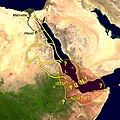Portal:Somaliland

Introduction
Somaliland, officially the Republic of Somaliland, is an unrecognised country in the Horn of Africa. It is located in the southern coast of the Gulf of Aden and bordered by Djibouti to the northwest, Ethiopia to the south and west, and Somalia to the east. Its claimed territory has an area of 176,120 square kilometres (68,000 sq mi), with approximately 6.2 million people as of 2024. The capital and largest city is Hargeisa. Various Somali Muslim kingdoms were established in the area during the early Islamic period, including in the 14th to 15th centuries the Zeila-based Adal Sultanate. In the early modern period, successor states to the Adal Sultanate emerged, including the Isaaq Sultanate which was established in the middle of the 18th century. In the late 19th century, the United Kingdom signed agreements with various clans in the area, establishing the Somaliland Protectorate, which was formally granted independence by the United Kingdom as the State of Somaliland on 26 June 1960. Five days later, the State of Somaliland voluntarily united with the Trust Territory of Somalia (the former Italian Somalia) to form the Somali Republic. The union of the two states proved problematic early on, and in response to the harsh policies enacted by Somalia's Barre regime against the main clan family in Somaliland, the Isaaq, shortly after the conclusion of the disastrous Ogaden War, a 10-year war of independence concluded with the declaration of Somaliland's independence in 1991. The Government of Somaliland regards itself as the successor state to British Somaliland. Since 1991, the territory has been governed by democratically elected governments that seek international recognition as the government of the Republic of Somaliland. The central government maintains informal ties with some foreign governments, who have sent delegations to Hargeisa; Somaliland hosts representative offices from several countries, including Ethiopia and Taiwan. However, Somaliland's self-proclaimed independence has not been officially recognised by any UN member state or international organisation. It is the largest unrecognised state in the world by de facto controlled land area. It is a member of the Unrepresented Nations and Peoples Organization, an advocacy group whose members consist of indigenous peoples, minorities and unrecognised or occupied territories. Following the Las Anod conflict that emerged in 2022, Somaliland lost control of a significant portion of its eastern territory to pro-unionist forces who established the SSC-Khatumo administration. (Full article...) Selected article - The Mission of Somaliland in Whitechapel, London is the diplomatic mission of the Republic of Somaliland in the United Kingdom. The mission was established in 1991, shortly after Somaliland's unilateral declaration of independence from Somalia. The mission is not a fully-fledged embassy because the British government does not recognise Somaliland as an independent state, instead of viewing it as part of Somalia; however, it is the highest-level representation of the Government of Somaliland in the United Kingdom. It acts largely like any other embassy, issuing visas and Somaliland passports and representing Somalilanders in the UK. (Full article...) Did you knowGeneral images -The following are images from various Somaliland-related articles on Wikipedia.
Related portalsThings you can do
TopicsCategoriesAssociated WikimediaThe following Wikimedia Foundation sister projects provide more on this subject:
Somaliland newsSourcesDiscover Wikipedia using portals | ||||




































